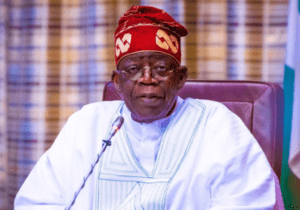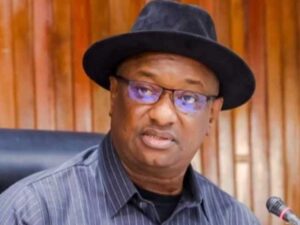
Victor Agi: Another season of bumper severance packages for public officers
A 2022 analysis of figures from the Revenue Mobilization and Fiscal Allocation Commission (RMFAC) by a Punch newspaper report put the severance package for President Muhammadu Buhari, Vice President Yemi Osinbajo, state governors and other political appointees leaving office this month at N63.45bn. This figure, according to the report, is different from other financial packages including retirement benefits or pensions.
The analysis revealed that political office holders were entitled to 300 percent of their annual salary as a severance package; with some state governors also entitled to 100 percent of their annual basic salary for life after leaving office, aside from other bumper packages for ‘serving’ their states for 8 years.
These official figures from the RMFAC are a far cry from what some state governors have proposed and approved for themselves through state legislation. For instance, Daily Post just reported that the Ebonyi State House of Assembly approved the sum of N1.6 billion as a severance package in what was described by the leader of the House, Victor Chukwu as “appreciating those who have worked with the governor.”
He was quoted as further saying that the severance package is “an extension of the empowerment program that the governor has been doing and there is nothing new about it.” What a way to describe and justify the payment of severance packages for public officers.
Ebonyi State is not alone in this “state empowerment program.” Before a purported downward review by Governor Babajide Sanwo Olu in 2020 due to public outcry, the Lagos State severance packages for governors signed into law by the now president-elect, Bola Ahmed Tinubu are staggering and incredulous.
An ex-Lagos governor is entitled to two houses in Lagos and Abuja respectively, six brand new cars which are replaced every three years, furniture allowance of 300 percent of annual salary to be paid every two years, and a reported N2.5 million monthly as pension, among other humongous components.
As at the last count, about 22 state governments have signed into legislation this arrangement that arrogates state resources to governors and state legislators upon leaving office. It is even more ridiculous for Governors who eventually became senators after their tenures, actively being paid from the nation’s confers as lawmakers and also parting away with their enormous severance packages and pension at the same time.
This has become our reality in the same country where the highest ranked civil servant which is the position of the permanent secretary takes home 300 percent of their meagre annual basic salary of N1, 925,865.00 that amounted to N5, 777,595.00 after 35 years of active service to the country.
Needless to mention that thousands of civil servants who painstakingly served the country for 35 years continue to fruitlessly struggle to be paid their pension and other emoluments, with some losing their lives in the process of waiting to get their entitlements. Isn’t it also absurd that some governors who cornered state resources in the guise of severance packages continue to contest and have refused to implement the N30,000 minimum wage law, with some governors still owning their civil servants for several months?
It is therefore against natural justice that people who could not substantially make a meaningful impact in the lives of ordinary people during their term in office would part with so much public fund as severance and pension for the rest of their lives.
How do we rationalize the very fact that these state governments are currently indebted to the tune of over N5 trillion naira as of December 2022 in the domestic debt profile without commensurate impact in the lives of the people of their states, but would go ahead to plunder their states further?
It is even more unfortunate because a majority of the states under the watch of the outgoing governors exist merely to pay salaries from monthly allocations. It is hard to point to any creative project that will continue to generate revenue for their respective states. It is no wonder that the World Bank Macro Poverty Outlook for Nigeria described the nation’s fiscal condition as “a more fragile position than before the late 2021 global oil price boom,” putting the country’s National poverty rate at 41.1%, and further revealing that the country used 96.3 percent of its revenue generated in 2022 to service debt.
There is also the controversial issue where the Central Bank of Nigeria’s advances (Ways and Means) to the government have ballooned in the last seven years to N22.7 trillion, violating the Banks’ law which stipulates that advances “shall not at any time exceed five (5) percent of the previous year’s actual revenue of the Federal Government.”
Last week’s securitization of the CBN Ways and Means by the National Assembly has officially put our public debt at N68.95 trillion, representing a 447 percent increase from the 12.6 trillion the administration met in 2015.
In spite of the negative growth indicators, inflation and huge debt burden staring us all in the face, to what end, therefore, are public servants parting away with so much from our coffers?
How do we make sense of the level of impunity by some of these public officers, the unemployment and the multi-dimensional poverty that is a consequence of the actions and inactions of those in charge of governance? While a “labourer” is worthy of his/her wages, one wonders if many of the public servants who are expecting these severances packages would “handsomely reward” an employee who had run their businesses the way they have spearheaded the affairs of the country in the last eight years.
Reward in the form of a severance package in the public service is certainly expected, but rewarding a public servant in whatever capacity who has incurred more debt and has not added substantially to the living standard of the people is rather problematic and would mean that the country has systemized rewarding failure. This is an anomaly that we must continue to interrogate.
Victor Agi is a Fiscal Transparency analyst and can be reached via [email protected]



